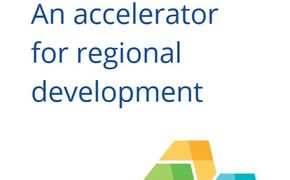On 14 and 15 October 2020, the Policy Learning Platform held an on-line peer review for the Košice Self-governing Region (Slovakia), which needed advice for improving the effectiveness of its framework for sustainable waste management and the circular economy.
The host's main policy challenges and peers' suggestions can be found in the peer review follow-up report.
With the twofold goal of better implementing its Waste Management Plan in line with the waste hierarchy and of facilitating the implementation of its Regional Integrated Strategy for quality of life end environmental protection, the Košice Self-governing Region requested a peer review to explore two issues of particular concern for its territory.
- Sustainable Waste Management and Circular Economy in ‘controlled organisations’: The Region wanted to explore initiatives to engage entities such as schools, cultural organisations and social bodies in the ‘3Rs’ (reuse, reduce & recycling), in particular by means of small pilot actions that could bring them to work together.
- Regional tools to support Sustainable Waste Management in a Circular Economy: The Region was looking for instruments to identify the right stakeholders in the area of sustainable waste management and to involve them actively in the development of a regional circular economy strategy capable of producing tangible results in terms of environmental protection, innovation, skills and knowledge transfer.
Peers from across Europe
Alongside Astrid Severin and Marco Citelli, our environment and resource efficiency experts, brilliants peers were invited and participated to the peer review:
- Jack McQuibban, Zero Waste Europe (Belgium),
- Igor Kos, WCYCLE Institute Maribor (Slovenia),
- Milan Veselinov, CirEkon, West Balkans, (Serbia),
- Tim Walker, Former Head of Waste Belfast (Northern Ireland, UK),
- Marco Mattiello, Contarina S.p.A., (Italy).
They came together to offer their expertise and professionalism to help the Košice Self-governing Region embark on its circular economy challenges. They shared a series of valuable suggestions on the two issues outlined above, gave their insight on the main obstacles to be expected along the way and shed light on inspiring solutions for waste prevention and waste management that are successfully being put in place by other European Regions.
Policy recommendations
Among others, the peers recommended the Košice Self-governing Region to act on food waste prevention by establishing the right regulatory framework and by supporting eco-innovations such as apps for the collection and distribution of unsold meals from restaurants and canteens and by encouraging home and community composting. They also suggested to strengthen reuse and repair initiatives and to introduce economic incentives such as pay-as-you-throw schemes to engage organisations and households in waste reduction and high-quality recycling. Peers also advised the Košice Self-governing Region to develop its circular economy strategy by actively involving in the process all stakeholders and to engage in education for example through a circular economy academy.
The Host used this on-line peer-review as an opportunity to start gathering local stakeholders and discuss with them about the most appropriate solutions for enabling the transformations in the field of waste management expected by the Region in the light of the European Green Deal.
Satisfied by two full days of rich exchanges under the aegis of the Policy Learning Platform, Tomas Malatinec, from the Department of Regional Development of the Košice Self-governing Region, stated: "Thanks to all this information, we will be able to foster our transformation towards a more circular region” while Barbora Kovacova added: "The peer review was an amazing experience, we have learned a lot and we are doing a small step in order to become a greener region".
Discover more insights and suggestions from the peer review in the follow-up report.









